Top Tips for Creating a Law School Finals Study Schedule
Top Tips for Creating a Law School Finals Study Schedule
For many law school classes, the majority (or entirety!) of your final grade is based on the final exam. This is why it is so important to create a personalized law school finals study schedule that will work for you! Don’t save your studying until the last minute, which will only serve to add more pressure to what is already a high-stress time for most students. Set yourself up to succeed on your law school exams by making a study schedule before your last day of classes. Your law school finals study schedule should center on three key components: (1) outlining for each exam, (2) reviewing and memorizing your outlines, and (3) taking practice exams. Below we explain how to map out your “big picture” plan and then the day-to-day details to effectively and efficiently study so you can ace your final exams!
Top Tips for Creating a Law School Finals Study Schedule
Establish Your “Big Picture” Plan
First thing’s first—get a blank calendar. Write out the “big picture” items. These are really just the broader points of what you will include in your law school finals study schedule.
Exam Day
Write in the dates and times of your exams. This is the one item on your schedule that you have no control over. Make sure that you have your exam dates and times written down correctly (and update the calendar if anything changes!). Your exam dates are the starting point. You will work backward from your exam date to plan out the rest of your studies.
Day Before Exam
The day before each exam, plan to study for just that exam. E.g., if your Torts exam is on a Wednesday, plan to study only Torts on Tuesday (the day before the exam). Attempting to study other subjects likely will prove too distracting. Remember that the goal is to stay effective and efficient!
Day Of Exam
On the day of each exam, if your schedule allows, consider taking a break from studying. Maybe you’ll spend some time reviewing for your exam the morning prior, but don’t immediately move on to studying for the next exam if you can avoid it. Of course, if you have two exams two days in a row, this may not be possible. But taking a break is healthy and will help avoid burnout!
Days Off
Do you already know that you need to schedule a half-day off (or maybe even a full day off) from studying on a weekend to avoid burnout or to go to a family event or a prior commitment? Write it in. No one can study for hours and hours on end every day without taking breaks. Don’t make your law school finals study schedule impossible to follow—make it work for you!
Remaining Days
Look at how many blank, remaining days you have left on your calendar between the end of classes (or whenever your study schedule begins!) and the start of your exams. Start to think about which subjects you will study on which days. Plan to study no more than two subjects per day. If you try to study three or four subjects in a day, you likely will get overwhelmed and stressed. Sticking to one or two subjects per day will keep you focused and productive! Also consider how much time you will need to schedule for each subject. Maybe you are a Contracts savant and have the law pretty well memorized already, but you really struggle with Torts. You’ll want to include more time in your schedule to focus on Torts and less time reviewing Contracts. Personalize your law school finals study schedule to fit your individual needs!
With the big picture items down, you now have a roadmap and can focus on your day-to-day plan.
Plan Out Your “Day-to-Day”
Now to plan the detail. The “day-to-day” of your law school finals study schedule will encompass three key components: (1) outlining for each exam, (2) reviewing and memorizing your outlines, and (3) taking practice exams. You won’t do all of these for each subject in a single day. For example, it’s impossible to review and memorize an outline that you have not yet created! Each day should focus on one or two of these components though.
Keep in mind that there will be overlap between the three components. For example, imagine your Civil Procedure outline is complete, and you have reviewed and memorized the rules and elements. You take a Civil Procedure practice exam, and a concept comes up that you did not review. It’s because you forgot to include it in your outline! You then need to go back to revise your outline. That was not on the schedule—but that’s okay! The study process is fluid. Even with the best-laid plans, something may come up that needs adjusting, so be flexible!
Outlining for Each Exam
Before you can memorize, review, and practice, you need to have a solid outline for each subject prepared. Having an outline that you create yourself will ensure you are familiar with the material and fully grasp the concepts therein, making the study process easier. Ideally, you will have started outlining early in the semester. If your outlines are already complete, that’s great! Most likely though, you probably have some outlining left to do (and that’s okay too!). Your top priority should be to finish your outlines for each subject. Schedule time at the start of your law school finals study schedule to do so.
How much time you need to include in your schedule for outlining will depend on how far along you are in the process of completing the outlines. Here are some things that your outlines should include:
Rules and Elements of Law
Include the rules and elements of the law—particularly the rules and elements of law discussed in class. Keep in mind that the goal is to connect concepts and rules together so you can get a bigger picture of the law and how it fits together.
Cases
Add brief descriptions (one or two sentences) of landmark cases and other important cases discussed in class. Do not go crazy with this! You do not need to include a million cases, as a general rule.
Class Notes
Class notes are one of the best resources for your outline. Since your professors will likely test what they taught in class, make sure that you incorporate key points from your class notes into your outline.
Even if you have excellent class notes, you may still want to compare your outline to a commercial outline to double-check the rules of law and see that you included all important concepts. Learn more about the law school outlines that JD Advising has available here!
Chances are you have done some of the above throughout the semester. Be honest with yourself about the current progress of your outlines. Schedule enough time to incorporate the above tips to finish the outlines (just don’t spend too much time—because creating an outline is only the first step to studying!).
Haven’t started your outline yet and not sure where to start? Check out our in-depth guide on how to create a law school outline here. Depending on when you start making your schedule though, you may not have time to start your own outline. If that’s the case, try to get an outline from a student who has taken your class with the same professor in the past, or obtain a commercial outline. (We recommend the former if possible! The more tailored an outline can be to your professor, the better!)
Regardless of where you are in your outlining process, completing your outlines should be the top priority in your law school finals study schedule!
Reviewing and Memorizing Your Outlines
Once your outlines are complete, you can begin to review and memorize them. Having the rules and elements of law well memorized is crucial for success on your law school exams! It is going to be very hard to recite and apply the law if you do not even have it memorized. An incorrect or incomplete rule statement can throw off your entire answer, so it is important to schedule adequate time for this component.
Not sure how much time you will need to schedule for reviewing and memorizing your outlines? Consider all that reviewing and memorizing entails. It involves more than just reading through your outlines a few times (which is what is referred to as “passive” studying). You want to actively engage with the material to efficiently and effectively study. Here are several techniques that work.
Divide Your Outline
Divide your outline into sections and memorize the rules one section at a time. By tackling smaller sections, the material is more manageable and easier to memorize! Once you are all set with a section, move on to the next.
Quiz Yourself
After you have started memorizing, cover up your notes and see if you can recite or rewrite them. Forgot an element? Go back and study that rule again! Keep quizzing yourself to test your knowledge.
Draw Diagrams or Concept Maps
Are you a visual learner? If so, maybe you’d prefer to draw diagrams or concept maps to help see a complicated rule broken out into steps.
Use Flashcards
Although you don’t want to spend too much time creating flashcards in the weeks leading up to your exam, reviewing pre-made flashcards is a great way to actively study and memorize! Don’t have any pre-made flashcards ready to go? Learn more about JD Advising’s law school flashcards available here!
The review and memorization process will likely take up a decent period of your study time, so plan accordingly in your law school finals study schedule!
For more advice on how to review and memorize, check out our seven tips for learning your law school outlines here.
Taking Practice Exams
Lastly—but certainly not least—leave time to practice, practice, practice! This cannot be emphasized enough. Most students take the time to outline and memorize because knowing the law is obviously necessary to get a good grade on your exam. However, it takes more than just being able to recite the law to do well on your exam. Knowing how to recite the law and knowing how to apply the law are two very different things. Taking practice exams allows you to identify the facts under which the law (that you have worked so hard to memorize!) applies.
Similar to reviewing and memorizing your outlines, taking practice exams will take a decent amount of your study time. Here are a few techniques to keep in mind when considering how much time you will need to schedule to take practice exams.
Short Hypotheticals or Practice Problems
When you first start out, you may want to begin with completing short hypotheticals or practice problems instead of jumping right into completing an entire practice exam. This is a great way to see if you actually know the law and if you understand how to apply it to a fact pattern.
Professor’s Past Exams
Try to take as many of your professor’s past exams for a subject as possible. Most law schools make them available to students, along with sample answers. Your professor’s past exams are the best example of what your exam will look like!
Self-Assess
Take time to not only complete practice exams but also compare your answer to the model answer. Is your format similar? Did you spot all the issues correctly? Are your answers substantively on track? Did you make use of all relevant facts from the fact pattern in your analysis? Did you correctly conclude as to each issue? If you got an answer wrong, was it because you didn’t have the rule memorized? Did you misread the facts? Did you not understand what the question was asking? Self-assessment helps you to go the extra mile while studying. Awareness of what you need to work on will help you to improve and be better prepared on exam day!
Want a more in-depth breakdown of practice exam techniques? Check out our article on how to take law school practice exams here.
In addition to scheduling enough time for taking practice exams, make sure you are preparing properly. Take practice exams that match the exam format that you’ll be given. For example, if your exam consists of only essays, then practice writing essays. If your exam consists of only multiple-choice questions, practice answering multiple-choice questions. Don’t fill your schedule with practicing exam formats that won’t be useful!
For more advice on how to prepare for exams, check out our in-depth guide on how to answer law school exam questions here.
Keep Your Schedule Realistic
One final point. Stay realistic about what you can accomplish in a day. Don’t try to review five subjects in one day or try to get 30 hours of outlining done over two days. Don’t schedule yourself for 12 hours of work in a single day with no breaks. If you do, you are just setting yourself up to fail. The whole point of making the schedule is to keep your studying efficient and effective!
When all is said and done, your law school finals study schedule should look something like this:

Once your law school finals study schedule is made, the real work begins! The good news is that, by taking the time to it all plan it out, you have done everything you can to set yourself up for success on your exams. We wish you the best of luck on all your exams!
Seeking Success in Law School?
- Benefit from personalized one-on-one tutoring by our seasoned law school tutors.
- Explore our NEW and highly acclaimed law school study aids, available for a free trial.







Leave a Reply
Want to join the discussion?Feel free to contribute!